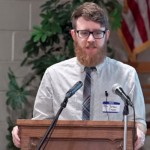The time of Pentecost is one in which the church has the opportunity to speak of certain truths which might, at times, be somewhat neglected in Lutheran preaching. Due to the centrality of the second article of the Creed, sometimes, the third can be forgotten. As I have been preparing for my sermon on Pentecost, I have been looking over some of the comments from C.F.W. Walther made in his own preaching during this season. He defines the celebration of Pentecost with the following words: “For what are we celebrating today? It is the fact that God has not only united himself personally with our human nature in Christ, but now is uniting in grace with every single human being and wants to make his dwelling in his heart.”[1] Walther certainly had no strong aversion to preaching about Christ “in us,” as if it somehow is opposed to the proclamation of Christ “for us.” For him, the mystical union is one of the most important truths of the Christian faith. In a great summary statement, Walther writes:
It is not enough for God only to have his work take place in us people and to fill us with his gifts, with his light, his power and his comfort, he wants himself, with his nature, to enter our hearts. It is not enough for God only to make people his priests, who come before him and serve him, but he also wants to make them his temples in which he serves them. It is not enough for God to someday receive his people into heaven where they shall look upon him, who is enthroned in glory, face to face, but he himself, already here, wants to make them into his heaven and establish his throne in them.[2]
This mysterious union is, for Walther, the grounding of the Christian’s life of sanctification. He further states: “So should God enter into the heart of a person, then, first, a great transformation of his nature take place. Indeed, it is impossible in this life for a person to be completely free of his sins, but should the Holy Ghost make it his dwelling, his heart must be utterly freed from its love of sins.” [3] Nature itself is transformed through this indwelling. One might, then, say that this is Walther’s idea of theosis. This is consistent with how he speaks elsewhere. It is not uncommon for Walther to use a form of Athanasius famous dictum such as when he states: “God’s Son became like us, that we should again become like God. He assumed the likeness of a sinner to bring us back to the likeness of God.”[4]
Walther’s statements here should be an encouragement to pastors to preach on the whole council of God. These truths of the mystical union that God has with the believer are essential to the life of faith, and we should be willing to speak about them! Pentecost gives us the opportunity to remind our congregations of this reality.
[1] Walther, Our Master’s Table, 76.
[2] Walther, Our Master’s Table, 75.
[3] Walther, Our Master’s Table, 75.
[4] Walther, Selected Sermons, 20.














